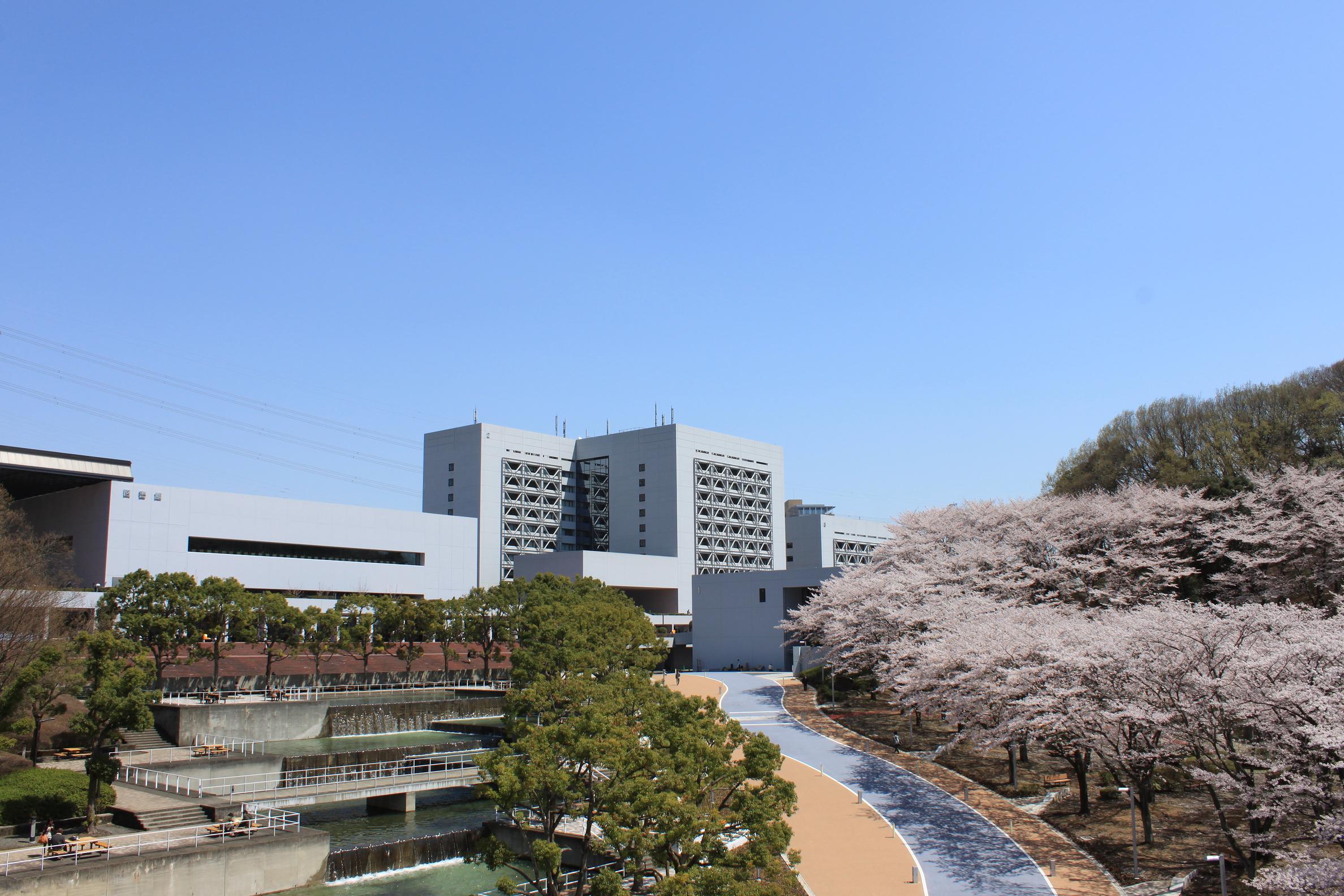The metaverse is currently attracting attention.Metaverse means "meta (transcendence) + universe (universe)", and users can freely act as avatars in VR (virtual reality) and AR (augmented reality) environments. It's an "other world on the internet" where you can interact.Applications are being explored not only in the fields of entertainment and games, but also in fields such as education, medicine, and welfare, but expectations are particularly high in the field of education.We will consider the current status and future prospects of Metaverse education from the practice of Associate Professor Yukie Saito of the Faculty of International and Informatics, Chuo University, who is working on English education using the Metaverse.
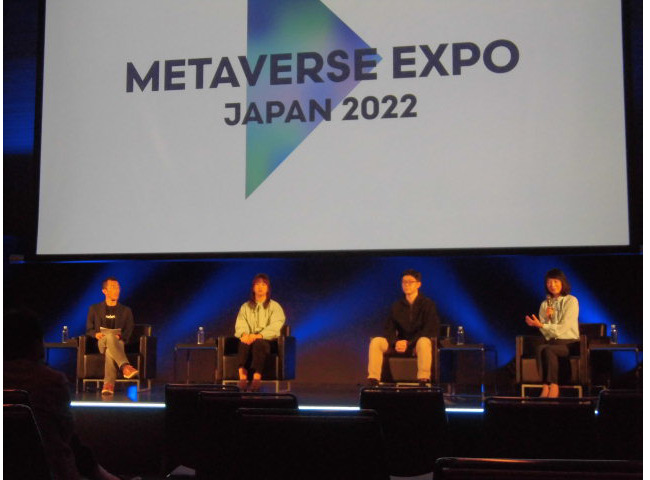
Experience the future of Metaverse education through VR experiences
On October 10th, Associate Professor Saito took the podium at the talk session of "METAVERSE EXPO JAPAN 19" hosted by Meta, held at Makuhari Messe, Chiba Prefecture, and spoke about "the possibility of using the Metaverse in education."Associate Professor Saito is in charge of foreign language education at the Faculty of International Information Studies, which was established in 2022, and his research theme is EdTech (Education & Technology).
Four years ago, he experienced a VR English learning service "immerse VR" by a native teacher and was impressed.In this program, students learn English conversation through avatars while immersing themselves in a virtual reality space that reproduces scenes such as airports and restaurants in XNUMXD images.Learning in a scene as if they were in the real world would increase the concentration of students, and the educational effect would be improved.She is now a strategic advisor to Immerse, and the Yukie Saito lab at Chuo University is the only partner in Japan to receive research support from Meta's "XR Program and Research Fund."
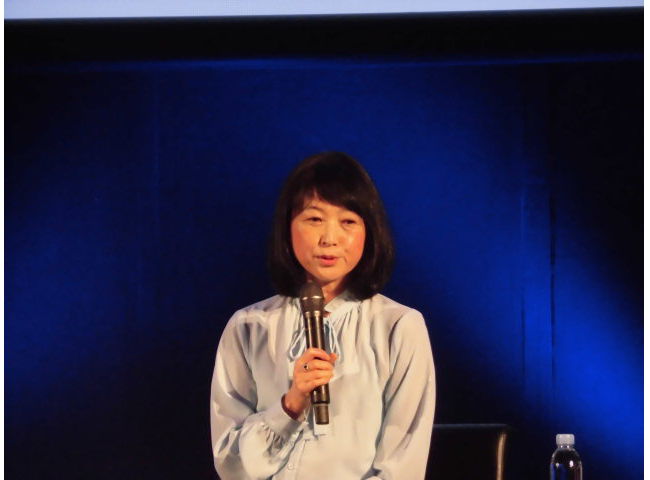
Excitement and anxiety relief increase motivation and improve English skills
In the Chuo University Faculty of International Information Studies, students are assigned to seminars from the latter half of their second year.The students who experienced the English class in the metaverse space (VR space) at the Saito seminar were very surprised, and after that they were absorbed in working on it.Soei Hotta, a current fourth-year student, describes her impression at the time as saying, "Wow!"With the VR goggles and HMD (head-mounted display) attached to the head, you can immerse yourself in a 360-degree three-dimensional space, and in a realistic virtual reality, your avatar can eat, dress up, and act freely. Before I knew it, I was filled with curiosity and excitement."
Tatsuyo Watanabe, who is also a fourth-year student, said, ``I used avatars to hold debates in English, and many people said that it was easier for them to express their opinions because they couldn't see the other person's face, including myself.'' .In the pre- and post-event surveys, many respondents said that speaking English reduced their anxiety and made them more confident.In fact, the study results showed that the score (average score) was 4 points higher on the TOEIC © Speaking test taken after the test compared to the TOEIC Speaking test taken beforehand.Associate Professor Saito says, ``Since the scenes in which English is used are vividly remembered, it leads to the acquisition of vocabulary, the retention of long-term memory, and the improvement of motivation. talk.After class, he summarizes the students' impressions and opinions and proposes ideas to Immerse. The virtual space “Social Lounge” on the immerse platform where students can gather for meetings, games, etc., is one of these realizations.
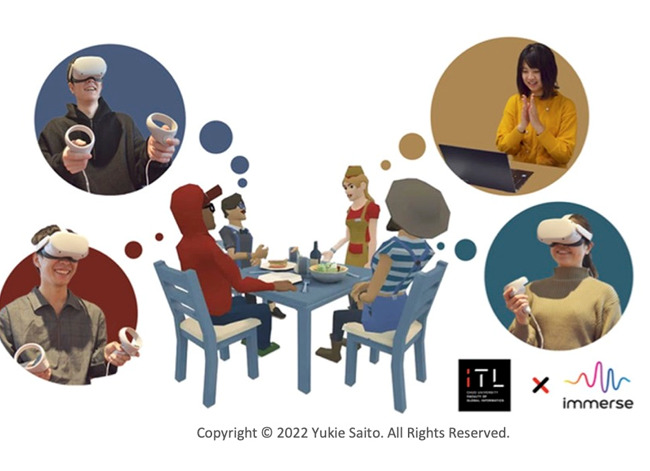
Students create lesson plans and act as teachers to guide junior students
Four seminar students, including Mr. Hotta, took on the role of teachers in the third year and instructed eight second-year students with a self-made curriculum. From around May, I started researching VR, created a lesson plan while discussing it in a group, and completed an English lesson program using Immerse, even during the summer vacation.Ms. Hotta said she wanted to cherish the excitement she experienced, and that she made the curriculum a fun way to learn English, like a simulation game.For example, at a fast food restaurant, students can play the role of a customer and a clerk, and if they play the clerk's role, they can learn in a way that is close to the actual situation, such as handing out hamburgers and operating the cash register.From this experience, Ms. Hotta also felt that Metaverse education could be used for teaching practice.It can also be applied to vocational training in various industries.
Associate Professor Saito also gives first-year English classes of 20 students a simple version of using smartphones in front of them to experience the Metaverse space.He projects 360-degree images of places related to his classes, and as an avatar, he experiences activities such as walking the streets of New York, climbing Mount Everest, diving under the sea, listening to concerts, and watching SDGs activities. is.Associate Professor Saito says that this is also an opportunity to think deeply about the contents of the textbook.He can also describe in English what students see in the virtual space while other students listen while drawing.
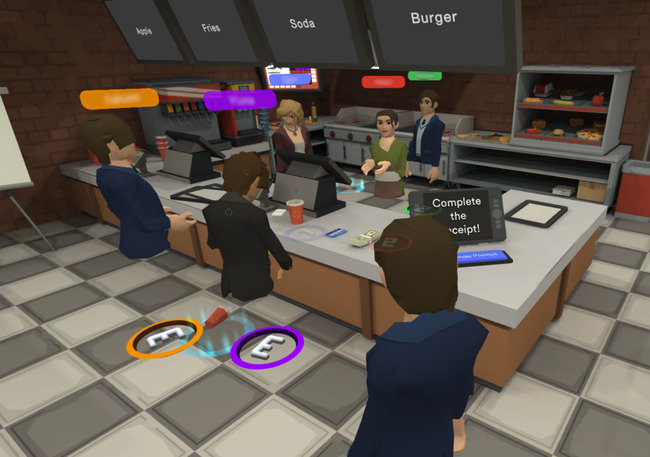
Utilized for internships and inter-university exchanges, and in the future, a project to support children who do not attend school
Associate Professor Saito is also in charge of an overseas study program called "International ICT Internship" at Chuo University that visits companies in Silicon Valley in the United States. In 2021, we were unable to dispatch students due to the coronavirus pandemic, but in 2022, we implemented a program using the Metaverse space as a preliminary training in preparation for the local dispatch.In addition to listening to online lectures on the effective use of AI and ethical issues by 11 IT companies in Silicon Valley, including GAFA (Google, Apple, Facebook = current Meta, Amazon.com), Zoom, and Netflix, VR We practiced discussions, debates, and presentations in English. In February 2023, it plans to send nine students to Silicon Valley for a two-week program.
In addition, Saito's seminar has been using the web conference system "Zoom" to conduct international language and cultural exchanges with American universities, but from 2023 they plan to use the Metaverse space.We want to create a 360-degree video of the university campus in the Metaverse space, where students from both universities can interact, and develop various problem-solving projects.
Associate Professor Saito also wants to use Metaverse education to solve educational problems.He believes that some seminar students and first-year students want to help truant children, and that a metaverse space that uses avatars can reduce the psychological burden of truant children. .As one of his seminar projects, he is also planning to collaborate with NPOs and NGOs that support children who do not go to school.
Metaverse education spreading to high schools and English conversation schools
Metaverse education is progressing rapidly outside of university education.In September 2022, the Faculty of Engineering of the University of Tokyo launched the Metaverse Education Project "Faculty of Engineering Metaverse", which consists of courses to learn mainly about the field of engineering.There is a "Junior Engineering Education Program" free of charge for junior high school and high school students, and a fee-based "Reskilling Engineering Education Program" for working adults that can be accepted on a corporate basis.Parents and teachers can also participate in the former, and there are classes to actually make a Metaverse and classes to make and fly flying robots.The latter consists of three fields: artificial intelligence, next-generation communication, and entrepreneurship education, and learns new knowledge and skills.
Taisho University has opened a “Taisho University Virtual Campus” where high school students from all over the country can communicate with current students, and Niigata University of Health and Welfare has opened a “Metaverse Open Campus” to deepen connections with high school students using VR technology. .An increasing number of universities are using it for classes and pre-study abroad education, and the use for lectures, meetings, and workshops is also expanding.
At the high school level, "Kadokawa Dwango Gakuen", which operates N High School and S High School, a correspondence high school that focuses on online learning, has implemented a program "General Course Premium" that utilizes the Metaverse. More than XNUMX Metaverse classes were prepared, and the entrance ceremony was held in the Metaverse space.In addition, AEON, which develops English conversation classes, is implementing an online English conversation program "AEON VR" that utilizes the Metaverse.
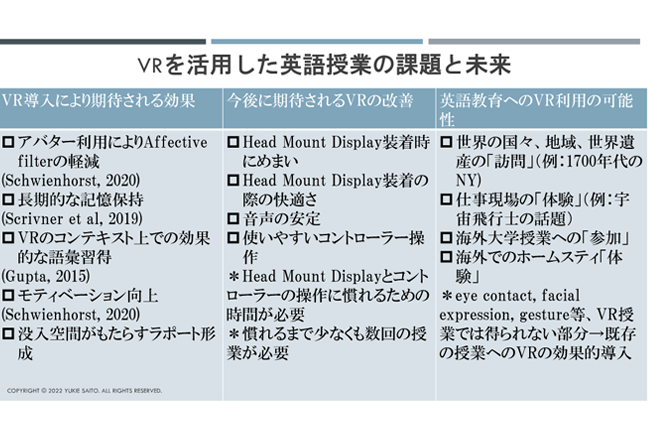
Learning styles that change greatly depending on the metaverse
The spread of smartphones and tablets is changing the learning style of young people.An increasing number of students are taking notes by copying lecture slides on their smartphones or entering search tags in the slide data instead of writing on paper in class.At the moment, it is difficult to take notes in the Metaverse space, but it is possible to take notes on important parts of the lesson, input impressions by voice, and leave search tags for review.It is also possible to research, simulate, present, discuss, and interact.Some students and researchers predict that, depending on future technological innovations, the Metaverse space will become an “external brain” similar to smartphones that can accumulate various information.
Metaverse education is still in the trial and error stage.However, the accumulation of practice has enriched teaching materials, and technological innovation has reduced introduction costs. Its spread will gain momentum.

